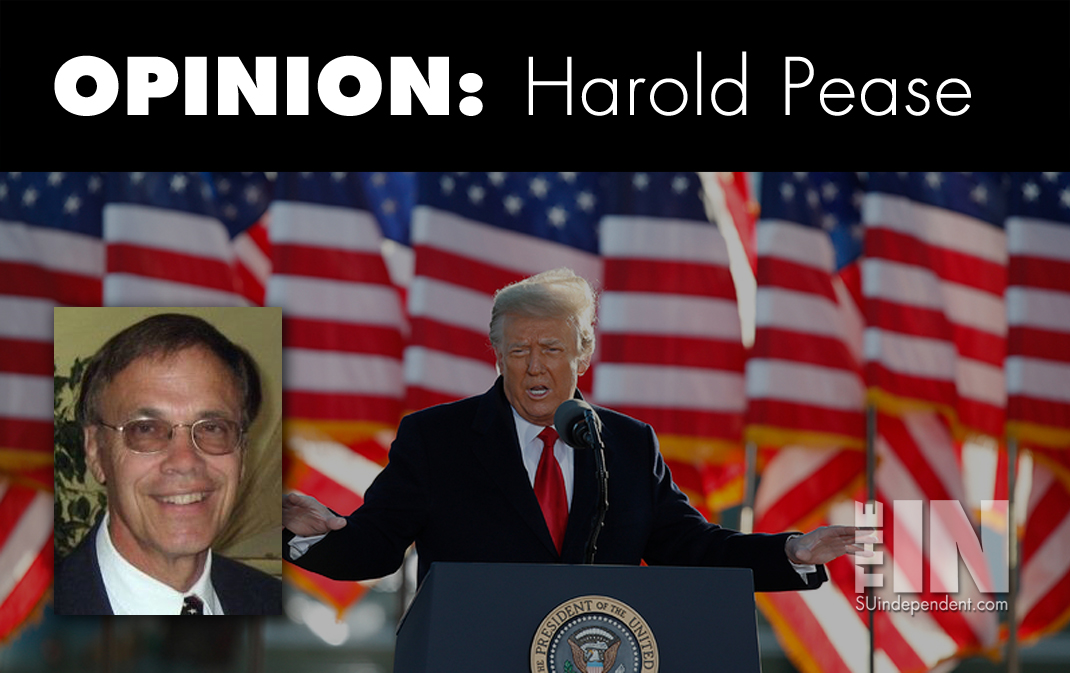
Who Ran America Before President Donald Trump?
– By Harold Pease, Ph. D –
America in 2015, before the movement that brought Donald J. Trump to power, felt deceived and betrayed in virtually every election by what was called the establishment. No matter how they voted, or who they sent to Washington, the parties seemed more the same than different, and little actually changed. Most felt something was wrong but few could articulate what that exactly was, but it was something. Some hidden force played a role.
For the first time in U.S. History, the establishment was toxic to voters in the 2016 presidential election. It demonstrated itself most clearly in the Iowa Caucus when non-establishment Republican candidates totaled 68% of the vote (Ted Cruz 28%, Donald Trump 24%, Ben Carson 9%, Rand Paul 5%, and Carli Fiorina 2%). Establishment candidate Jeb Bush spent more money than the others combined but could never get traction. Fifty percent of Democrats flocked to Bernie Sanders from long-term establishment candidate Hillary Clinton. Both parties were rejecting the Establishment.
So what is the “Establishment”? It is the moneyed elite capable of supplying candidates the millions of dollars they need to win elections. They exist in both major political parties, own the major media outlets, and the Internet as well. Therefore their influence over presidential candidates for over a hundred years is never really covered by their presses, thus they remain largely unknown to the public, but all candidates know of their influence and power.
Before President Donald Trump, no candidate for president got to office without their approval. Their influence brings to the top of each party a candidate acceptable to them and they allow voters to pick which of THEIR people, Democrat or Republican, they wish to lead. They never lose an election. The public face of this mostly secret combination is the Council on Foreign Relations which since 2016 has come to be known as the Deep State—the shadow government. It is the nations’ major proponent of The New World Order. All presidents from Herbert Hoover on until Trump have either been members of or had a close relationship with, the Council on Foreign Relations in New York City (CFR). This is a semi-secret establishment. When a president is not a member himself, his vice president almost always is. The then-president Barack Obama, although supported by the CFR, wasn’t on their published membership list, but he and Joe Biden were noted globalists. Since the late 1920’s virtually all of our secretaries of state, United Nations’ ambassadors, and ambassadors to Russia and China have been members of this Wall Street special interest group. Moreover, CFR members largely filled the majority of presidential cabinets.
No special interest group, the last 100 years, has had more impact than the CFR over foreign policy leading many to question if we had but one political party in the United States with two arms. Indeed, until 2017 many saw no significant difference in foreign policy between George W. Bush and Barack Obama. Nor was there between George Bush and Bill Clinton. The CFR supported Barack Obama, probably the most anti-war candidate in a couple of decades, and so condemnatory of his predecessor in this area, but as president not only continued the Bush wars but added Libya and central Africa to the list while sponsoring drone killings (acts of war) in Pakistan, Syria, and Somali.
Until 2017 there existed little difference in foreign policy between parties. Neither had an America-First foreign policy. Both got their advisors from the same Wall Street special interest group—the CFR. Both supported extensive foreign aid, policing the world with over 900 military bases in other lands, and continual wars without declaration or pre-established end. They supported international trade agreements that mostly benefited their wealthy members and exported jobs formerly held by Americans. All, excepting Ronald Reagan, enhanced the power of the United Nations. Both parties placated China on virtually every issue. The term “establishment” came to represent this sameness.
On domestic policy, both parties supported the bank bailouts and their management of the money supply through the banker’s private Federal Reserve Bank. Neither talked about returning a third of the United States (sometimes called government land) to the states from which it was taken. Neither problem solved with the Constitution as first consideration or followed it as written. Neither valued limited government or federalism. Both supported problem-solving on the federal or international level rather than the state level.
Notable political scientist Lester Milbraith observed in his work Domestic Sources of Foreign Policy, p. 247, that “the influence of the CFR throughout government is so pervasive that it is difficult to distinguish the CFR from government programs.” Prominent political scientist Thomas R. Dye in his textbook Who’s Running America? The Bush Restoration, p. 188, wrote, “The history of CFR policy accomplishments is dazzling,” then traced in detail their dominating role in foreign policy accomplishment from the 1920s through the George Bush Administration from their own boasts of success in Council on Foreign Relations Annual Reports.
What is wrong with this mostly “secret society?” In 1954, The Reece Congressional Committee noted that its productions “are not objective but are directed overwhelmingly at promoting the globalism concept”—world government How powerful was it by the time Congress first discovered its influence? It had come, they wrote, “to be in essence an agency of the United States government, no doubt carrying its internationalist bias with it” (Pp. 176-177).
Who ran America before Donald Trump?—The Council on Foreign Relations. The movement against the establishment preceded Trump with the Tea Party but they welcomed his America First policies and he, for four years, stopped the globalist’s drive for a New World Order. Patriots loved him but every globalist slithered out of the pit of Hell to destroy him and the patriot movement that preceded him.
Viewpoints and perspectives expressed throughout The Independent are those of the individual contributors. They do not necessarily reflect those held by the staff of The Independent or our advertising sponsors. Your comments, rebuttals, and contributions are welcome in accordance with our Terms of Service. Please be respectful and abide by our Community Rules. If you have privacy concerns you can view our Privacy Policy here. Thank you!
Click here to submit an article, guest opinion piece, or a Letter to the Editor




